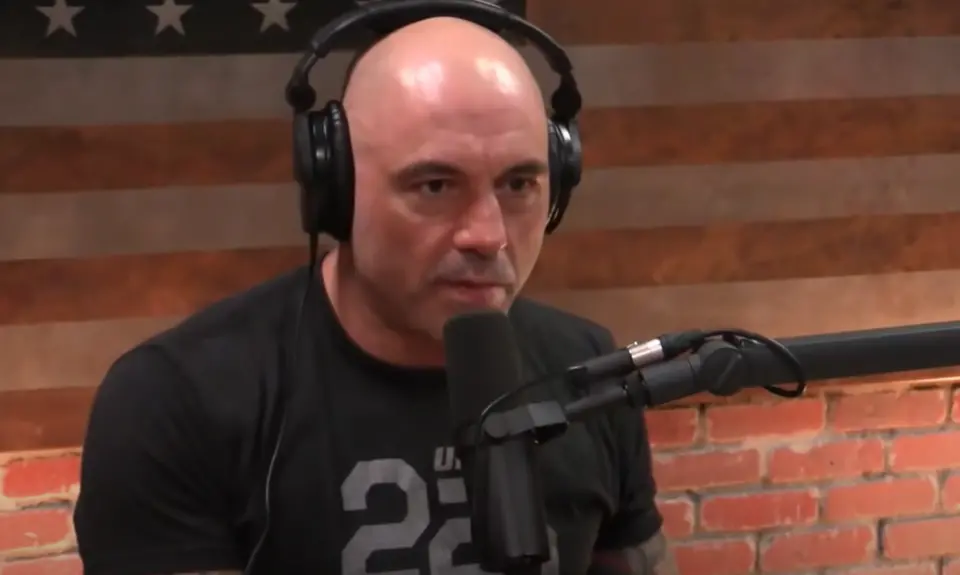Brazilian President Jair Bolsonaro wants to let Joe Rogan—the podcast host and former mixed martial artist currently embroiled in a scandal for spreading COVID-19 misinformation on Spotify—know that he has his back.
“I’m not sure what @joerogan thinks about me or about my government, but it doesn't matter. If freedom of speech means anything, it means that people should be free to say what they think, no matter if they agree or disagree with us. Stand your ground! Hugs from Brazil,” the far-right president tweeted Tuesday night.
Why in the world is the president of Brazil taking time to weigh in on Rogan and his critics?
Andre Pagliarini, an assistant professor of history at Hampden Sydney College who often writes on U.S.-Brazil relations, says the show of support was yet another example of the “Bolsonaro clan dragging U.S.-style culture wars into the very different world of Brazilian politics and media landscape.” Whether Bolsonaro’s social media slam on the moderation of misinformation in the name of fighting “Big Tech censorship” works in his favor will become more apparent when Brazil holds national elections in October.
Bolsonaro has himself spread misinformation about COVID-19. The so-called "Trump of the Tropics" has also suggested that the only way he could lose the upcoming presidential election is if the vote is rigged, and he has aligned himself closely with the police and military—all while signaling a need for a “quite probable and necessary countercoup” should he lose. Trump has endorsed Bolsonaro's reelection bid.
Bolsonaro became an ally to the Trump administration as soon as he assumed office in 2019. His son, Brazilian congressman Eduardo Bolsonaro, frequently traveled to the U.S. to engage with members of Donald Trump’s inner circle. The younger Bolsonaro even traveled to Washington, D.C., ahead of the Jan. 6 insurrection to meet with figures like Mike Lindell and Jared Kushner, as detailed in a recent report by the nonprofit research organization Advance Democracy, Inc.
There are other parallels between the politics of Trump and Bolsonaro. Like Trump, Bolsonaro had the support of MAGA strategist Steve Bannon and U.S. Christian right leaders during his 2018 campaign and his presidency.
And like their conservative counterparts in the U.S., right-wing politicians in Brazil have made "tech censorship" a campaign issue.
During Brazil’s 2018 presidential campaign, disinformation flooded WhatsApp—used by about 120 million Brazilians at the time—with the vast majority of false information favoring Bolsonaro. (If it sounds a bit like Facebook’s role in the 2016 U.S. election, may we remind you that WhatsApp’s parent company is, you guessed it, Facebook.) In October, Brazil’s Superior Electoral Court, which had conducted an inquiry into accusations that the 2018 Bolsonaro campaign coordinated disinformation on WhatsApp, acquitted Bolsonaro for lack of evidence.
But a member of the country’s Federal Supreme Court reiterated its message that "if there is a repetition of what was done in 2018, [politicians'] registrations will be revoked, and those who do so will go to jail for attacking Brazil's elections and democracy." Meanwhile, the country’s Supreme Electoral Court is considering banning Telegram, another source of disinformation, ahead of the October 2022 election.
Such measures to prevent the spread of misinformation in Brazil does not bode well for Bolsonaro. That may explain why in September, the far-right president moved to temporarily ban social media companies from taking down certain posts, including claims that the only way Bolsonaro will lose in October is by voter fraud. Here’s where the Rogan controversy comes into play.
“Making an issue of the Rogan thing can be seen as a preemptive move to invoke tech censorship throughout Bolsonaro’s presidential campaign,” Pagliarini told Right Wing Watch.
For years, Rogan—who is also a UFC commentator—has invited MMA fighters, fringe health experts, far-right figures, and conspiracy theorists like Alex Jones onto his Spotify-exclusive podcast, “The Joe Rogan Experience,” with an estimated 11 million listeners per episode. Since the onset of the COVID-19 pandemic, his podcast has spread misinformation about COVID-19 and vaccines, prompting 270 health experts to call on Spotify in January to moderate misinformation. The calls for moderation have grown. Last week, musicians Neil Young and Joni Mitchell asked Spotify to pull their music from the platform as long as Rogan’s podcast remained.
Eddie Bravo, an MMA instructor and flat-earther, (right) joined radical conspiracy theorist Alex Jones (left) on Joe Rogan’s show in 2019.
By inserting himself into the conversation, Bolsonaro can also highlight his popularity among MMA celebrities—another thing he happens to have in common with Trump—and encourage them to further spread his message of tech censorship.
MMA is the second or third most popular sport in the Brazil, and Jair Bolsonaro has basked in the endorsements of MMA fighters like Darren Till who, as my former colleague Karim Zidan reported for Bloody Elbow, used his speech after a UFC fight in 2017 to tell viewers, “Lula in jail and Bolsonaro 2018!” (Lula is a reference to former leftist Brazilian president Luiz Inácio Lula da Silva.) Zidan highlighted the dozens of fighters who have offered their support to Bolsonaro—many of whom are friendly with Rogan—including Brazilians Wanderlei Silva, Anderson Silva, Royce Gracie, and Renzo Gracie, who have between hundreds of thousands of followers to millions of followers each on social media.
Even with disinformation, the religious right, and MMA celebrities on Bolsonaro’s side, the Brazilian president appears to face an uphill battle to reelection. Bolsonaro’s handling of the pandemic, which has led to 629,000 deaths and counting, and its effects on the economy don’t bode well in the race against the popular former leftist Brazilian president Luiz Inácio Lula da Silva. Polls show if the election were held today, Lula could win by as many as 11 percentage points.





